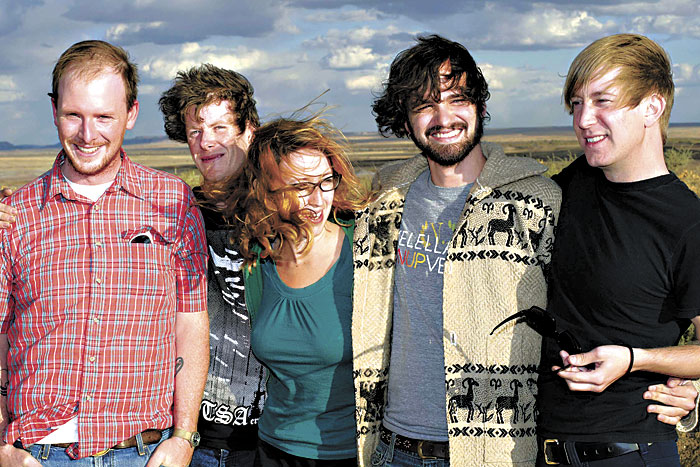The band Point Juncture, WA may not be named for a genuine geographic locale, but it’s clear that the relaxed pace of their actual hometown has played a huge role in the success of their collaboration. The four-piece collective shares a house in Portland, where they spent an entire year recording their third album, Heart to Elk, released Feb. 10. Initially seen as a casual project when they released their eponymous 2004 debut and the 2005 follow-up Mamma Auto Boss, Point Juncture, WA unexpectedly and joyously fell down a rabbit hole of creative exploration while working on their latest disc. Slowly the project took over their living space, with the band running cables through windows to capture the atmospheric sounds of hallways and eventually building a homemade plate reverb in their garage. “Our house turned into a laboratory with stomp boxes on every surface and microphones in every corner,” explains de facto band leader Victor Nash.
That aural labyrinth led to the creation of an absolutely gorgeous, intricately layered pop pastiche of sounds both found and methodically engineered. Their affection for acts like Yo La Tengo and Stereolab is apparent; indeed, vocalist and drummer Amanda Spring has an ethereal lilt to her voice evocative of Stereolab’s Laetitia Sadier, and a percussive persuasion for slyly building a tempo similar to the approach taken by Yo La Tengo’s Ira Kaplan. That said, what makes Heart to Elk such an enveloping journey (it practically insists on being listened to in its entirety at each sitting) is its dizzying variety of unique textures, structures, and tones. A vibraphone percolates in and out, a cello sneaks quietly in the back door, and broadly distorted guitars run through the middle of the songs when you least expect them.
“When we made this album, we started every song from scratch as though it had no relationship to the others,” explains Nash. “We tried to do the best for each song in the way we thought appropriate recording-wise, rather than make a record that is an accurate document of what the band sounds like live. I think that tells a little about how we write too. I like how sometimes with hip-hop records they treat every song like it’s the single—recorded in a different studio by a different engineer with different sounds. Hopefully, the songs themselves have enough continuity to bind them together as an album, even if we twist them in drastically different directions through the writing and arranging process.”
While they may make their home in our sister city to the south, it was a connection made at a Seattle show that led to their signing with local label Mt. Fuji Records. “I was tending bar during their last show at the Sunset, and I was totally blown away by their performance,” explains Mt. Fuji owner Mike Jaworski. “Victor gave me a CD-R of their record [afterward], and after a few listens, I was totally hooked. It felt like a special record from the first time I put it on. It encompasses so many things about music that I love…amazing songwriting, cool vocals, and really interesting production. The record takes all of the best elements of late-’90s indie rock and brings it forward to 2009 in a way that feels relevant.”
Throughout the recording process, various engineers and fellow musicians stopped by to consult, including Jackpot! Studios’ Kendra Lynn, Jason Powers from Type Foundry, and Sam Schauer with Modernstate. Former Seattleite Tucker Martine ultimately oversaw the final mixes. Nash feels the end result is a reflection of how Point Juncture, WA’s methodology eventually began to define them as a band.
“I always think of an interview with Robert Fripp where the interviewer asked him what makes a song a King Crimson song, as opposed to one of his other various songwriting and composing outlets,” says Nash. “He said that a band is only ‘a way of doing things.’ I think that’s very accurate to what Point Juncture is. I’m always amazed at what the other members of this band can do; they are constantly surprising me with their diverse abilities, but when we go to arrange a new song, or tour, or make a record, everyone finds their role very quickly.”








